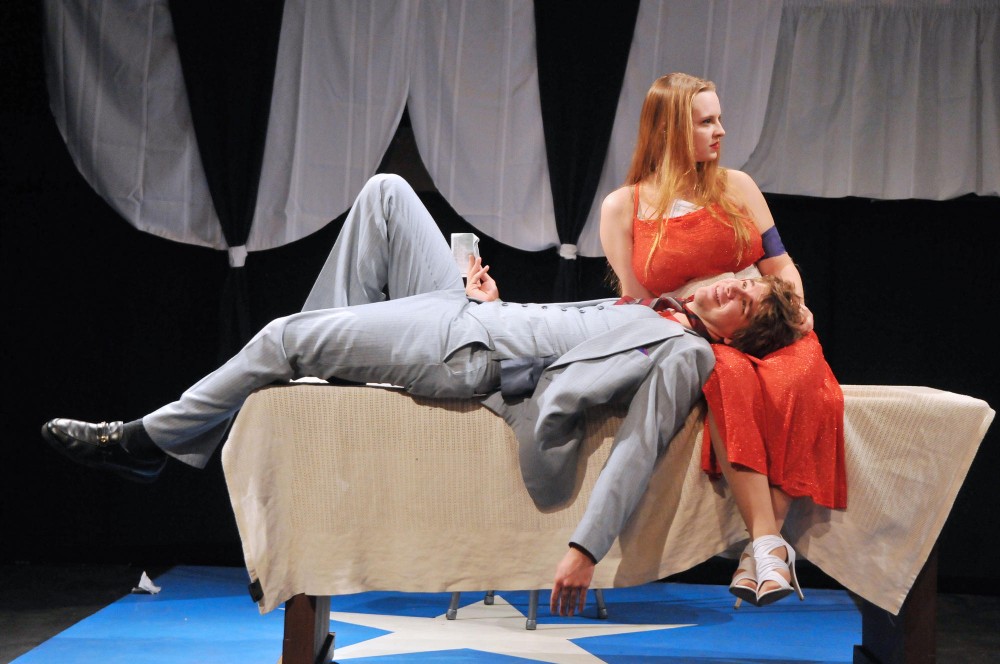What: âÄúThe Great(er) American Past TimeâÄù
When:7:30 p.m., tonight;
8 p.m., tomorrow and Saturday;
2 p.m., Sunday
Where: Rarig Center
Cost: Free, reservations required. Email [email protected].
Put on your thinking helmets and start your analysis engines. This weekendâÄôs production of âÄúThe Great(er) American Past TimeâÄù will leave you with a set of plotlines and symbolic characters to scratch your head over. Employing character names like the Joneses and Ignora Ramuse, the student-run productionâÄôs playwright has pointed to American greed and excess.
Nico Swenson first wrote âÄúPast TimeâÄù for a class last year. Now, the theater sophomore is watching the characters come to life, and heâÄôs watching the themes âÄî excess, greed, capitalism, consumerism âÄî stand up on their own feet in a cultural, political and economic landscape marked by conflict between the âÄúhavesâÄù and the âÄúhave-nots.âÄù
âÄúI feel like theater is a wonderful means to create social change and awareness,âÄù Swenson said. HeâÄôs trying to get audience members to think and then to talk about what theyâÄôre thinking.
To sink audience members into the deepest possible thought space, Swenson has used a unique style of language, which energetically wavers somewhere between Dr. Seuss and Shakespeare. ItâÄôs dense, rhythmic and often nonsensical.
âÄúI intentionally play with a very symbolic language so that it can be swung in multiple ways and so that the actor has to work to make sure they understand what theyâÄôre saying,âÄù Swenson said.
Swenson has given his cast the freedom to grapple with the playâÄôs text. He wants them to understand and interpret the lines to fit their own lives, rather than simply follow the script like an instruction manual.
âÄúI have spent more time outside of rehearsal on this show than I have on any other show,âÄù said Dan Flohr, a third-year theater major.
With bounding energy, the appropriately puppy-like Flohr plays the character of Sam. Audience members may quickly make the connection between the character and America âÄî Uncle Sam, anyone? Sam becomes addicted to what he calls âÄúSupplementary.âÄù
In a moment of textual simplicity, SamâÄôs ma warns him, âÄúSlow down. YouâÄôve grown too fast, if you can call this growing.âÄù
But overall, the play follows the style of this line, which Flohr delivers as he springs up from sleep: âÄúGod bless me with morning juice. God bless me all over my fortunately fortunate fortunes because I need Supplementary âÄî what!âÄù
In spite of the somewhat moonshine script, the characters journey through a definite story line.
âÄúThereâÄôs a lot of conceptual narrative that flows over the plot,âÄù Swenson said.
SwensonâÄôs been working with a largely inexperienced cast and crew. Many of them are embarking on their theatrical maiden voyage with this production.
âÄúI didnâÄôt know what I was doing. And a lot of our designers didnâÄôt know what they were doing,âÄù said stage manager Cate Glidden. Along with the costume designer, the lighting designer and much of the cast, Glidden is a first-timer.
Will Sullivan, a theater freshman who plays the character of Pa, has seen the show as a learning experience for him and his fellow newbies.
âÄúWeâÄôve been able to hang onto the more experienced people and build off each other. I think IâÄôve grown a lot because of that.âÄù Sullivan said.














